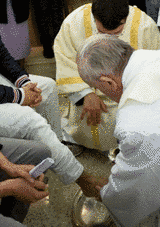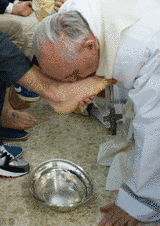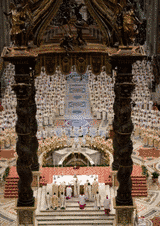Holy Thursday 2013
Papa Francisco's Homily
Mass of the Lord's Supper
Prison for Minors "Casal del Marmo", Rome, 28 March 2013 - in Arabic, English, French, German, Italian, Polish, Portuguese & Spanish
"This is moving. Jesus who washes the feet of his disciples. Peter didn’t understand anything, he refused. But Jesus explained it to him. Jesus – God – did this! He himself explains to his disciples: “Do you know what I have done for you? You call me Teacher and Lord – and rightly so, because I am. So if I, Lord and Teacher, have washed your feet, you also must wash each other’s feet. For I have set you an example, that you also should do as I have done to you” (Jn 13:12-15). It is the Lord’s example: He is the most important, and He washes feet, because with us what is highest must be at the service of others. This is a symbol, it is a sign, right? Washing feet means: “I am at your service”. And with us too, don’t we have to wash each other’s feet day after day? But what does this mean? That all of us must help one another. Sometimes I am angry with someone or other … but… let it go, let it go, and if he asks you a favour, do it. Help one another: this is what Jesus teaches us and this what I am doing, and doing with my heart, because it is my duty. As a priest and a bishop, I must be at your service. But it is a duty which comes from my heart: I love it. I love this and I love to do it because that is what the Lord has taught me to do. But you too, help one another: help one another always. One another. In this way, by helping one another, we will do good. Now we will perform this ceremony of washing feet, and let us think, let each one of us think: “Am I really willing, willing to serve, to help others?”. Let us think about this, just this. And let us think that this sign is a caress of Jesus, which Jesus gives, because this is the real reason why Jesus came: to serve, to help us."
RINGRAZIAMENTI DOPO IL SALUTO DEL MINISTRO SEVERINO:
Ringrazio la Signora Ministro delle parole, ringrazio le autorità per l’accoglienza e ringrazio voi, ragazzi e ragazze, per l’accoglienza di oggi: sono felice di stare con voi. Avanti, eh? E non lasciatevi rubare la speranza, non lasciatevi rubare la speranza! Capito? Sempre con la speranza, avanti! Grazie.
DOMANDA DI UN RAGAZZO:
Grazie Padre che sei venuto oggi. Ma io voglio sapere una cosa: perché sei venuto oggi qua a Casal del Marmo? Basta, solo quello.
RISPOSTA DEL PAPA:
E’ un sentimento che è venuto dal cuore; ho sentito quello. Dove sono quelli che forse mi aiuteranno di più ad essere umile, ad essere servitore come deve essere un vescovo. Ed io ho pensato, io ho domandato: “Dove sono quelli a cui piacerebbe una visita?” E mi hanno detto “Casal del Marmo, forse”. E quando me l’hanno detto, sono venuto qui. Ma dal cuore è venuto quello, soltanto. Le cose del cuore non hanno spiegazione, vengono solo. Grazie, eh!
SALUTI FINALI
Adesso mi congedo. Grazie tante della vostra accoglienza. Pregate per me e non lasciatevi rubare la speranza. Sempre avanti! Grazie tante!
Papa Francis's Homily at the Chrism Mass
Basilica of St John Lateran, 5 April 2012 - in Arabic, English, French, German, Italian, Polish, Portuguese & Spanish
"Dear Brothers and Sisters,
This morning I have the joy of celebrating my first Chrism Mass as the Bishop of Rome. I greet all of you with affection, especially you, dear priests, who, like myself, today recall the day of your ordination.
The readings and the Psalm of our Mass speak of God’s “anointed ones”: the suffering Servant of Isaiah, King David and Jesus our Lord. All three have this in common: the anointing that they receive is meant in turn to anoint God’s faithful people, whose servants they are; they are anointed for the poor, for prisoners, for the oppressed… A fine image of this “being for” others can be found in the Psalm 133: “It is like the precious oil upon the head, running down upon the beard, on the beard of Aaron, running down upon the collar of his robe” (v. 2). The image of spreading oil, flowing down from the beard of Aaron upon the collar of his sacred robe, is an image of the priestly anointing which, through Christ, the Anointed One, reaches the ends of the earth, represented by the robe.
The sacred robes of the High Priest are rich in symbolism. One such symbol is that the names of the children of Israel were engraved on the onyx stones mounted on the shoulder-pieces of the ephod, the ancestor of our present-day chasuble: six on the stone of the right shoulder-piece and six on that of the left (cf Ex 28, 6-14). The names of the twelve tribes of Israel were also engraved on the breastplate (cf Es 28, 21). This means that the priest celebrates by carrying on his shoulders the people entrusted to his care and bearing their names written in his heart. When we put on our simple chasuble, it might well make us feel, upon our shoulders and in our hearts, the burdens and the faces of our faithful people, our saints and martyrs who are numerous in these times.
From the beauty of all these liturgical things, which is not so much about trappings and fine fabrics than about the glory of our God resplendent in his people, alive and strengthened, we turn now to a consideration of activity, action. The precious oil which anoints the head of Aaron does more than simply lend fragrance to his person; it overflows down to “the edges”. The Lord will say this clearly: his anointing is meant for the poor, prisoners and the sick, for those who are sorrowing and alone. My dear brothers, the ointment is not intended just to make us fragrant, much less to be kept in a jar, for then it would become rancid … and the heart bitter.
A good priest can be recognized by the way his people are anointed: this is a clear proof. When our people are anointed with the oil of gladness, it is obvious: for example, when they leave Mass looking as if they have heard good news. Our people like to hear the Gospel preached with “unction”, they like it when the Gospel we preach touches their daily lives, when it runs down like the oil of Aaron to the edges of reality, when it brings light to moments of extreme darkness, to the “outskirts” where people of faith are most exposed to the onslaught of those who want to tear down their faith. People thank us because they feel that we have prayed over the realities of their everyday lives, their troubles, their joys, their burdens and their hopes. And when they feel that the fragrance of the Anointed One, of Christ, has come to them through us, they feel encouraged to entrust to us everything they want to bring before the Lord: “Pray for me, Father, because I have this problem”, “Bless me Father”, “Pray for me” – these words are the sign that the anointing has flowed down to the edges of the robe, for it has turned into a prayer of supplication, the supplication of the People of God. When we have this relationship with God and with his people, and grace passes through us, then we are priests, mediators between God and men. What I want to emphasize is that we need constantly to stir up God’s grace and perceive in every request, even those requests that are inconvenient and at times purely material or downright banal – but only apparently so – the desire of our people to be anointed with fragrant oil, since they know that we have it. To perceive and to sense, even as the Lord sensed the hope-filled anguish of the woman suffering from hemorrhages when she touched the hem of his garment. At that moment, Jesus, surrounded by people on every side, embodies all the beauty of Aaron vested in priestly raiment, with the oil running down upon his robes. It is a hidden beauty, one which shines forth only for those faith-filled eyes of the woman troubled with an issue of blood. But not even the disciples – future priests – see or understand: on the “existential outskirts”, they see only what is on the surface: the crowd pressing in on Jesus from all sides (cf Lk 8:42). The Lord, on the other hand, feels the power of the divine anointing which runs down to the edge of his cloak.
We need to “go out”, then, in order to experience our own anointing, its power and its redemptive efficacy: to the “outskirts” where there is suffering, bloodshed, blindness that longs for sight, and prisoners in thrall to many evil masters. It is not in soul-searching or constant introspection that we encounter the Lord: self-help courses can be useful in life, but to live our priestly life going from one course to another, from one method to another, leads us to become pelagians and to minimize the power of grace, which comes alive and flourishes to the extent that we, in faith, go out and give ourselves and the Gospel to others, giving what little ointment we have to those who have nothing, nothing at all.
The priest who seldom goes out of himself, who anoints little – I won’t say “not at all” because, thank God, the people take the oil from us anyway – misses out on the best of our people, on what can stir the depths of his priestly heart. Those who do not go out of themselves, instead of being mediators, gradually become intermediaries, managers. We know the difference: the intermediary, the manager, “has already received his reward”, and since he doesn’t put his own skin and his own heart on the line, he never hears a warm, heartfelt word of thanks. This is precisely the reason for the dissatisfaction of some, who end up sad – sad priests - in some sense becoming collectors of antiques or novelties, instead of being shepherds living with “the odour of the sheep”. This I ask you: be shepherds, with the “odour of the sheep”, make it real, as shepherds among your flock, fishers of men. True enough, the so-called crisis of priestly identity threatens us all and adds to the broader cultural crisis; but if we can resist its onslaught, we will be able to put out in the name of the Lord and cast our nets. It is not a bad thing that reality itself forces us to “put out into the deep”, where what we are by grace is clearly seen as pure grace, out into the deep of the contemporary world, where the only thing that counts is “unction” – not function – and the nets which overflow with fish are those cast solely in the name of the One in whom we have put our trust: Jesus.
Dear lay faithful, be close to your priests with affection and with your prayers, that they may always be shepherds according to God’s heart.
Dear priests, may God the Father renew in us the Spirit of holiness with whom we have been anointed. May he renew his Spirit in our hearts, that this anointing may spread to everyone, even to those “outskirts” where our faithful people most look for it and most appreciate it. May our people sense that we are the Lord’s disciples; may they feel that their names are written upon our priestly vestments and that we seek no other identity; and may they receive through our words and deeds the oil of gladness which Jesus, the Anointed One, came to bring us. Amen."
© Copyright 2012 - Libreria Editrice Vaticana









